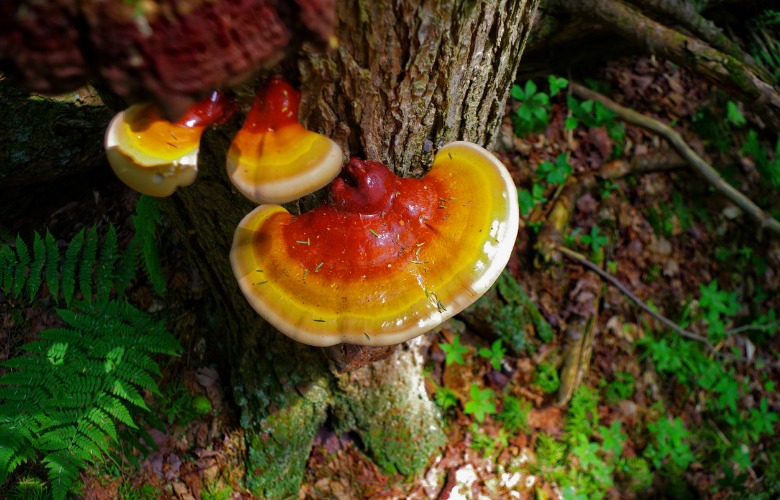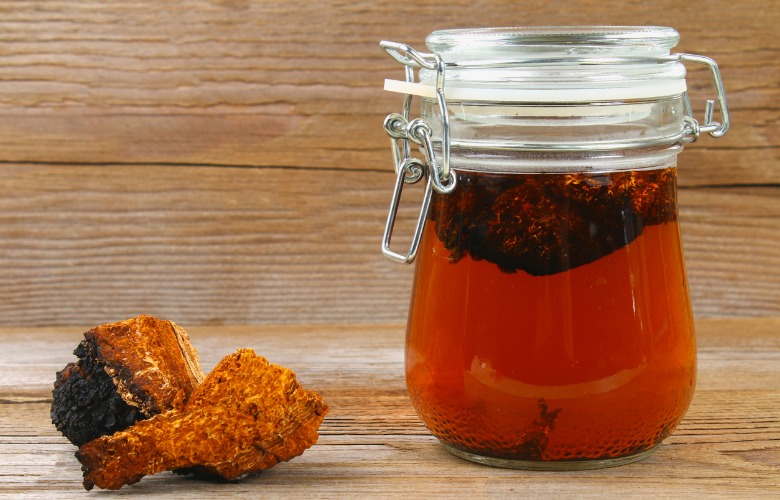Mushrooms for Wellness
A Few Ways Mushrooms Can Support Wellness
Lower Cholesterol
Mushrooms have no cholesterol or fats; in addition, they are very low in carbohydrates. The fiber and enzymes in mushrooms have been shown to help lower cholesterol levels.
Support Bone Health
Mushrooms are an excellent source of calcium, which supports bone strength and formation.
Boosts the Immune System
Ergothioneine, a powerful antioxidant, is present in mushrooms. It helps provide protection from free radicals and supports immune system functions. This antioxidant is unique to mushrooms and has anti-inflammatory properties. In addition, mushrooms contain natural antibiotics that inhibit microbial growth and some fungal infections. Shiitake mushrooms contain a type of sugar molecule called lentinan which has been found to kill viruses and microbes. Beta-glucan is found in many varieties of mushrooms and has immune-boosting properties.
Mushrooms are Nutritious
They are high in vitamin D, as well as B vitamins, including B12 which is often found in animal products. Mushrooms are an excellent plant-based vitamin B12 source, which is perfect for vegetarians and vegans. Mushrooms are also rich in selenium. Selenium is important to bone health, strengthens teeth, hair and nails, as well as ridding the body of free radicals. Copper and iron are also found in mushrooms; working together, copper can stimulate the absorption of iron in the body.
Popular Varieties
Try these mushroom varieties:
- Button
- Chanterelles
- Cremini
- Morels
- Portobello
- Enoki
- Shiitake
- Oyster
- Porcini
- Reishi.
Finally, the health benefits of mushrooms are numerous and eating a variety of mushrooms can support wellness and boost the immune system. It is recommended that they are cooked, as the nutrients are better digested this way.
The Benefits of Reishi Mushrooms
Also known as lingzhi and Ganoderma lucidum, the reishi mushroom grows in Asia and has been used in Eastern medicine for thousands of years. Often used as symbols of wellness and longevity, the reishi mushroom is known as “mushrooms of immortality”.
The Science Behind the Reishi Mushrooms
Reishi mushrooms can be eaten fresh and contain health benefits, however, it is when they are powdered or made into extracts that certain molecules are present: (1)
- Triterpenoids – compounds that contain six isoprene units and have demonstrated antioxidant and anti-inflammatory properties.
- Polysaccharides – is a large molecule made of smaller monosaccharides or simple sugars – like glucose. Polysaccharides from mushrooms have been shown to stimulate immune function and inhibit the growth of tumors. In addition, they have cardiotonic effects, enhance metabolism and support normal sexual function. (2)
- Peptidoglycans – also known as murein, is a polymer of amino acids and sugars. When peptidoglycan recycles “gram-positive bacteria”, studies show it is crucial for the long term survival of this good bacteria such as Staphylococcus aureus, Bacillus subtilis, and Streptomyces coelicolor. (3)

Benefits of Reishi Mushrooms
Longevity
Studies show that reishi mushrooms can help you live longer. The molecule polysccharides has been found to reduce aging by supporting normal immune function and preventing cancerous growths. (4)
Boost Your Immune Function
This is probably the most well-known use of reishi mushroom. Move over orange juice! Add reishi to your morning coffee or smoothie and reap its benefits. Research shows that reishi may alter white blood cell inflammation pathways and can increase the activity of white blood cells naturally fighting off infections and cancer in the body. (5)
Reduce Fatigue, Depression, and Anxiety
A study found that people with certain diseases or illnesses took reishi mushrooms and found that fatigue was reduced. They also discovered that they experienced less depression and anxiety. (6)
Additional Benefits of Reishi:
- May decrease triglycerides and increase HDL cholesterol (7)
- May help your liver to eliminate toxins more efficiently
- May improve liver cell regeneration
- Helps to rid your body of free radicals
- Have neuroprotective properties
- Antioxidant-rich.
How Do You Take Reishi Mushroom?
Reishi mushroom can be eaten fresh and whole, however most often they are taken as a dried extract, supplement or liquid extract.
Often serving sizes range from 25 to 100 grams, depending on many factors. Please see the label or your healthcare professional for further recommendations of serving sizes.
Reishi mushroom can be added to coffee or smoothies or made into a tea. They can be used fresh and added to a variety of dishes.
Chaga Mushroom Benefits
Chaga mushroom is a highly nutrient-dense superfood containing vitamins and minerals. They have gained popularity in the wellness community for their health benefits and are often consumed as teas and coffees.
Chaga Mushroom History
Chaga mushrooms (Inonotus obliquus) grow on birch trees found in the northern hemisphere. They have a long traditional use in folk medicine and often brewed a long time in hot water to make a tea or coffee. Chaga mushrooms can also be eaten whole, made into syrups and used in baths.
Tzar Vladmir Monamakh attributed the disappearance of his lip tumors to Chaga mushroom in the 12th century in Russia. Later in the 26th century, Shen Nung Pen Ts’ao Ching named chaga the “king of herbs”.

Health Benefits of Chaga Mushroom
Supports the Immune System
Compounds in Chaga mushrooms have shown that they can help differentiate between foreign cells and the body’s cells – helping the immune system. (8)
Reduce Oxidative Stress
Chaga has high antioxidant properties and has been shown to fight oxidation. Studies show that Chaga mushrooms contain antioxidant activities that “reduces more than 40% of the DNA damage by hydrogen peroxide.” (9)
Reduces Growth of Certain Cancers
Studies show that Chaga extract contains anti-cancer properties that reduced the growth of cancer cells. (10)
Increases Endurance
Chaga increases exercise tolerance and physical endurance as it activates the pathways associated with insulin signaling and energy metabolism.
Anti-viral Properties
Studies show that Chaga mushroom has an antiviral effect on human immunodeficiency virus (HIV) type 1. (11)
Ways to Use Chaga
- Whole mushroom
- Mushroom coffee or tea
- Capsule or tablet
- Ground or Powdered
- Tincture
How to Make Chaga Tea in Your Slow Cooker
- Place chunks of Chaga or ground Chaga in a large slow cooker and pour water over it.
- Cover the slow cooker and bring the Chaga to a quick boil on high.
- Turn down heat to low and simmer it for at least 2 hours or up to 6-8 hours.
- Strain the brewed Chaga into glass jars and store for up to one week in the refrigerator.
References
1 Batra P, Sharma AK, Khajuria R. Probing Lingzhi or Reishi medicinal mushroom Ganoderma lucidum (higher Basidiomycetes): a bitter mushroom with amazing health benefits. Int J Med Mushrooms. 2013;15(2):127-43.
2 Mišurcová L1, Škrovánková S, Samek D, Ambrožová J, Machů L. Health benefits of algal polysaccharides in human nutrition. Adv Food Nutr Res. 2012;66:75-145. doi: 10.1016/B978-0-12-394597-6.00003-3.
3 Marina Borisova,a Rosmarie Gaupp,b Amanda Duckworth,a Alexander Schneider,a Désirée Dalügge,a Maraike Mühleck,a Denise Deubel,a,* Sandra Unsleber,a Wenqi Yu,a,* Günther Muth,a Markus Bischoff,b Friedrich Götz,a and Christoph Mayercorresponding authora. Peptidoglycan Recycling in Gram-Positive Bacteria Is Crucial for Survival in Stationary Phase. mBio. 2016 Sep-Oct; 7(5): e00923-16. Published online 2016 Oct 11.
4 Chuang MH1, Chiou SH, Huang CH, Yang WB, Wong CH. The lifespan-promoting effect of acetic acid and Reishi polysaccharide. Bioorg Med Chem. 2009 Nov 15;17(22):7831-40. doi: 10.1016/j.bmc.2009.09.002. Epub 2009 Sep 6.
5 Cheng CH1, Leung AY, Chen CF. The effects of two different ganoderma species (Lingzhi) on gene expression in human monocytic THP-1 cells. Nutr Cancer. 2010;62(5):648-58.
6 Zhao H1, Zhang Q, Zhao L, Huang X, Wang J, Kang X. Spore Powder of Ganoderma lucidum Improves Cancer-Related Fatigue in Breast Cancer Patients Undergoing Endocrine Therapy: A Pilot Clinical Trial. Evid Based Complement Alternat Med. 2012;2012:809614. doi: 10.1155/2012/809614. Epub 2011 Dec 10.
7 Chu TT1, Benzie IF, Lam CW, Fok BS, Lee KK, Tomlinson B. Study of potential cardioprotective effects of Ganoderma lucidum (Lingzhi): results of a controlled human intervention trial. Send to Br J Nutr. 2012 Apr;107(7):1017-27. doi: 10.1017/S0007114511003795. Epub 2011 Aug 1.
8 Caifa Chen, Weifa Zheng, Xiaowen Gao and Xiaoyan Xiang. “Aqueous Extract of Inonotus bliquus (Fr.) Pilat (Hymenochaetaceae) Significantly Inhibits the Growth of Sarcoma 180 by Inducing Apoptosis.” American Journal of Pharmacology and Toxicology. Volume 2, Issue 1 Pages 10-17.
9 Park YK1, Lee HB, Jeon EJ, Jung HS, Kang MH. “Chaga mushroom extract inhibits oxidative DNA damage in human lymphocytes as assessed by comet assay.” Biofactors. 2004;21(1-4):109-12.
10 Hyun Sook Lee, Eun Ji Kim, and Sun Hyo Kim. “Ethanol extract of Innotus obliquus (Chaga mushroom) induces G1 cell cycle arrest in HT-29 human colon cancer cells.” Nutr Res Pract. 2015 Apr; 9(2): 111–116. Published online 2015 Mar 12.
11 Shibnev VA, Garaev TM, Finogenova MP, Kalnina LB, Nosik DN. “[Antiviral activity of aqueous extracts of the birch fungus Inonotus obliquus on the human immunodeficiency virus].” Vopr Virusol. 2015;60(2):35-8.

Jemile earned a degree in Food Studies and Writing and has worked for almost 23 years in the medical and health industries. She has been a digital marketing consultant for Acupuncture Atlanta since 2011 as the social media manager and content manager. Writing has been a childhood dream for Jemile and writing daily for clients in the health, wellness, food, and art industries have been phenomenal. Jemile is originally from Brooklyn, NY, and lives in the Hudson Valley, NY. She lives with her husband, two daughters, her dog, and two fish. You can contact Jemile via Linkedin, her mom blog, or her website, lunaroseconsulting.com



